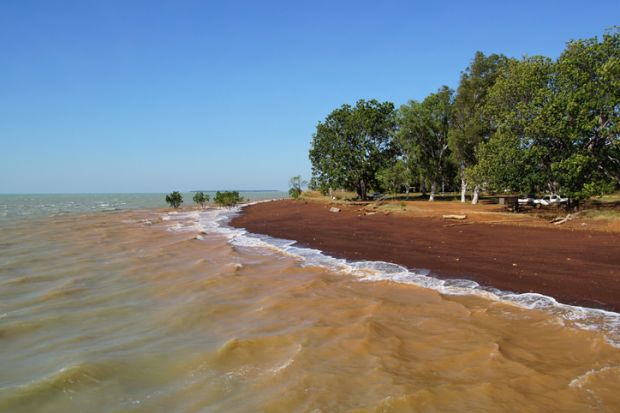An Australian university has refused to say whether it is considering disciplinary action against an academic found by a senior judge to have subverted science in an unsuccessful attempt to stop a A$5.8 billion (£3 billion) gas project.
University of Western Australia (UWA) marine geoscientist Mick O’Leary earned scathing criticism from Federal Court judge Natalie Charlesworth, who has dismissed an application from three Indigenous Australians to block construction of a 262km gas pipeline near the Tiwi Islands, north of Darwin.
Dr O’Leary, who describes himself as a climate geoscientist, focuses his research on sea level reconstructions and the archaeology of submerged landscapes.
Justice Charlesworth found that he had lied to Tiwi Islanders and shown them misleading maps to exaggerate the potential legal and spiritual significance of underwater features – including what he claimed had been a “huge” freshwater lake, before the area was inundated after the last ice age – near the pipeline’s planned route.
The lake supposedly matched descriptions of terrain inhabited by spiritual entities called Crocodile Man and Mother Ampiji, whose stories had been transmitted through hundreds of generations via oral histories known as songlines. The islanders feared that the pipeline would upset Ampiji, the protector of the sea, causing storms and other disasters.
Dr O’Leary also presented evidence associating landforms on the seabed with ancient burial sites. Justice Charlesworth concluded that his intent had been to “coach” the islanders on what to say about the submerged landscapes, to enhance their arguments against the pipeline.
“My conclusions about Dr O’Leary’s lack of regard for the truth, lack of independence and lack of scientific rigour are sufficient to discount or dismiss all of his reports for all purposes,” her judgment says. “I would not accept his evidence as sufficient to establish any scientific proposition at all.
“The acrobatics concerning the Crocodile Man story are suggestive of an expert who is seeking to present a case [rather than] scientific truth. [His] conduct [is] far flung from proper scientific method, and falls short of an expert’s obligation to this court.”
Dr O’Leary, who obtained his doctorate at James Cook University (JCU), was part of a research team that attracted headlines in 2020 when it claimed to have found the country’s first underwater archaeological sites off Western Australia’s northern coast.
Piers Larcombe, a former UWA marine geoscientist who taught Dr O’Leary at JCU and later worked alongside him, said the young academic had allowed himself to become “spread too thin”.
“I’ve known Mick O’Leary for many years. He’s not a bad person, but perhaps he’s had his head turned. Within UWA, he’s got few people who challenge and mentor him, and I suspect he’s got used to a lack of effective challenge. He’s also working well outside his core expertise, as Justice Charlesworth noted.”
Dr Larcombe was part of a group that analysed the 2020 research and found that of 16 “explicit assumptions” in the study, only half had been tested and “none to a degree that might have produced a clear result”.
“Claims of perceived ground‐breaking discoveries should require peerless critical thinking, research and scholarship,” Dr Larcombe and colleagues wrote, in a 2022 paper that was subsequently retracted because the authors had not obtained ethics clearance that the university considered necessary. Dr Larcombe said this would have required clearance from co-authors of the paper being critiqued.
UWA and Dr O’Leary declined requests for comment. The Australian Academy of Science, which has championed calls for a “reliability standard” for scientific evidence presented in trials, also refused to comment.
Register to continue
Why register?
- Registration is free and only takes a moment
- Once registered, you can read 3 articles a month
- Sign up for our newsletter
Subscribe
Or subscribe for unlimited access to:
- Unlimited access to news, views, insights & reviews
- Digital editions
- Digital access to THE’s university and college rankings analysis
Already registered or a current subscriber? Login










